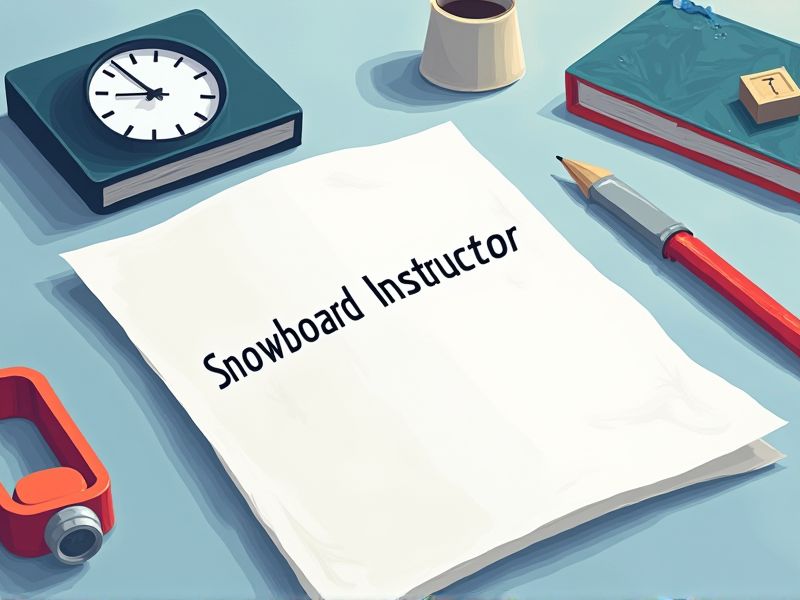
Becoming a snowboard instructor demands specific certifications to ensure both the safety and skill development of students on the slopes. These certifications are crucial as they equip instructors with the necessary techniques for effective teaching and handling emergencies. As the sport involves risk, proper certification instills credibility and professionalism. Essential certifications for a snowboard instructor include the following.
American Association of Snowboard Instructors (AASI) Level 1 Certification
AASI Level 1 Certification establishes a foundational standard of teaching skills and technical knowledge for snowboard instructors, ensuring they can provide safe and effective lessons. This certification helps maintain consistency and quality across snowboarding schools and resorts, attracting more participants to the sport. It provides instructors a structured educational pathway, enhancing their professional credibility and paving the way for career advancement. In many resorts, AASI Level 1 Certification is a prerequisite for employment, signifying a baseline competency in instructing beginners.
American Association of Snowboard Instructors (AASI) Level 2 Certification
Achieving the AASI Level 2 Certification signifies an instructor's ability to teach intermediate snowboarding skills, thus enhancing their teaching repertoire. This certification often leads to increased job opportunities and potential higher pay in the snowboarding industry. Ski resorts tend to favor hiring instructors with advanced certifications to ensure quality instruction for their guests. Instructors with Level 2 Certification can offer improved training to their students, leading to higher client satisfaction and return rates.
American Association of Snowboard Instructors (AASI) Advanced Certification
Achieving AASI Advanced Certification can result in higher employment opportunities for snowboard instructors, as ski resorts often seek out highly credentialed staff. Advanced Certification equips instructors with specialized skills and updated teaching techniques, enhancing the learning experience for students. Instructors with this credential can expect increased earning potential, as their expertise is recognized by industry professionals. The certification further demonstrates a commitment to professionalism and continuous improvement in snowboarding instruction.
International Ski Instructors Association (ISIA) Snowboard Certification
Possessing an ISIA Snowboard Certification ensures that an instructor has met a global standard of skill and teaching proficiency, enhancing their credibility. The certification facilitates international employment opportunities, as many ski schools recognize and often require it for hiring instructors. With the rise in snowboarding's popularity, having a standardized certification helps maintain quality and safety in instruction, benefiting both instructors and students. Certification often leads to higher pay and career advancement, as it signals expertise and commitment to professional development.
Professional Ski Instructors of America - AASI Snowboard Certification
Obtaining the Professional Ski Instructors of America - AASI Snowboard Certification standardizes the skill level and teaching methods of snowboard instructors. By aligning with this certification, instructors gain access to structured training that enhances their technical and pedagogical abilities. The certification offers a recognized credential that helps instructors improve job prospects and credibility in the competitive snow sports industry. This credential provides assurance to clients about the quality and safety of the instruction they receive.
Avalanche Safety Training (e.g., AIARE Level 1)
Avalanche Safety Training equips snowboard instructors with critical knowledge to evaluate snowpack stability, reducing the risk of accidents in avalanche-prone areas. By understanding terrain features and weather conditions, instructors can make informed decisions to ensure safer routes for their students. Proper training enhances emergency preparedness, enabling instructors to respond effectively in case of an avalanche incident. The skills acquired in these courses build confidence and professionalism, fostering trust among clients and the snowboarding community.
Wilderness First Aid Certification
Snowboard instructors often operate in remote mountain areas where immediate medical assistance may not be available, necessitating Wilderness First Aid Certification to manage potential injuries on-site. Accidents and falls on the slopes can lead to trauma or other health emergencies that demand prompt and knowledgeable response. Certification equips instructors with the skills to assess and stabilize injuries until professional medical help arrives. The training fosters a safer environment for both instructors and participants, instilling confidence in safety protocols on the mountain.
CPR/AED Certification
Snowboard instructors work in environments where accidents and injuries are more likely due to high speeds and varying terrain. Immediate response to cardiac emergencies can dramatically improve survival rates; CPR/AED certification equips instructors to act effectively. Ski resorts often have remote locations where emergency medical services could be delayed, making on-site first aid crucial. Certification can enhance an instructor's professional credibility and reassure clients about their safety.
National Ski Patrol Accreditation
National Ski Patrol Accreditation is required for snowboard instructors to ensure safety and enhance rescue skills on the slopes. Accreditation provides standardized emergency response training, reducing accident-related risks for snowboarders. Instructors with this credential can effectively coordinate with patrol teams during emergencies. Adherence to these guidelines fosters a safer skiing and snowboarding environment, promoting trust among participants.
Backcountry Safety and Rescue Certification
The Backcountry Safety and Rescue Certification equips snowboard instructors with critical skills for assessing and mitigating avalanche risks, ensuring safer navigation in unpredictable terrains. With this certification, instructors gain the expertise to recognize and respond to emergency situations, which could potentially save lives in remote areas. The certification instills confidence in clients, promoting trust in the instructor's ability to manage challenging backcountry conditions. Certified instructors contribute to a culture of safety and preparedness, essential for responsible backcountry snowboarding experiences.
Summary
When you pursue certifications as a snowboard instructor, your credibility in the industry immediately enhances. This often leads to better job opportunities and increased pay. Employers tend to favor certified instructors, attributing to a higher level of trust and responsibility. Certifications also expand your skill set, enabling you to teach diverse techniques that attract a wider range of students.
